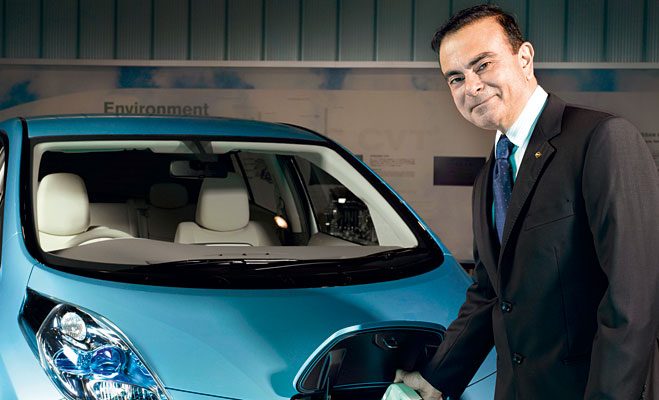Electric highway – zero emission mobility
Thanks to consumer preferences and technological advances, the Renault-Nissan Alliance is making zero-emission mobility a reality for consumers around the world

In December 1898, the battery-powered Jeantaud Duc became the world’s fastest car with a speed of 63.15 km/h. Electric cars were seen as modern, safe and convenient. But within a couple of decades, oil companies had created an ecosystem of wells, refineries and pumps to take advantage of the energy density and abundance of petroleum. Carmakers shifted focus, concentrating overwhelmingly on the petrol-powered internal combustion engines that dominated the twentieth century.
However, no trend can last forever. In the past decade, political tensions among oil-producing and oil-consuming nations have exposed the danger of relying on one single, non-renewable fuel source. Air quality has eroded to dangerous levels in some cities. Noise pollution escalates. Irrefutable evidence of climate change accompanies rising C02 emissions. Socially and environmentally responsible citizens – particularly young people – are demanding clean alternatives to conventional cars.
Automakers have achieved admirable increases in fuel efficiency by improving internal combustion engines and by introducing hybrid cars that occasionally switch to batteries. But the only way to significantly reduce C02 emissions from the transportation sector is to build new vehicles that do not consume any petroleum whatsoever. Fortunately, advances in lithium-ion technology allow us to move into the era of zero-emission transportation – starting right now.
Green power
Unlike petrol-powered cars, electric vehicles consume nearly any form of energy – including abundant hydropower and the growing supply of renewable solar and wind power. As these renewable energy sources increase, CO2 emissions will shrink further. Climate change, consumer preferences and advances in technology: These are some of the reasons the Renault-Nissan Alliance decided to mass-produce electric vehicles. In so doing, the Renault-Nissan Alliance became the first carmaker to make zero-emission cars affordable, convenient and fun.
At the end of 2010, after a decade developing the compact laminated lithium-ion battery pack, the group started selling the Nissan LEAF. More than 25,000 people on three continents have driven more than 35m miles in Nissan LEAFs, saving at least 800,000 gallons of petrol. That’s the equivalent of 7,300 tonnes of C02 that have not been emitted. And most people who buy the Nissan LEAF say that it has replaced their conventional car for daily use.
In 2011, Nissan sold more than 22,000 LEAFs, now the most popular zero-emission car of all time. Renault introduced two additional zero-emission models for Europe and Israel – the Renault Fluence Z.E. and the Renault Kangoo Z.E. van. The company also started trials of a light commercial vehicle, the e-NV200. In 2012, the group will be introducing Renault’s Twizy urban two-seater vehicle and Renault ZOE subcompact to the market. By 2016,the Renault-Nissan Alliance expects to sell cumulative 1.5m battery∞powered vehicles.
The long-term vision is to help create a sustainable society where zero-emission transportation is mainstream. This is our ethical imperative – and a calculated business move based on consumer preferences and tougher environmental mandates. By 2020, the EU wants C02 emissions cut by 20 percent compared to 1990 levels. By 2020, the US wants C02 emissions cut by 17 percent compared to 2005 levels. Given these trends, the status quo is no longer tenable: Zero-emission transportation will play a hugely important part in a sustainable planet.
Driving forward
The Renault-Nissan Alliance’s vision is larger than zero-emission cars themselves. The group is refining vehicle-to-grid technology, which allows an idle EV to return power to the grid at peak times and recharge with cheaper, off-peak electricity. The technology will help customers use their batteries to power their homes and eventually recycle their batteries. Coupled with this, the group is making even longer-range batteries more affordable. Thanks to a strategic cooperation with Daimler, the prospect of fuel-cell vehicles is closer to reality every year.
The Renault-Nissan Alliance works closely with governments, universities, utility companies and non-profit organisations. Many countries offer cash rebates for customers who buy zero-emission vehicles. Such subsidies help boost consumer awareness and acceptance of clean cars. Other incentives include free parking, the use of bus lanes, free electricity for EVs and EV-only zones in cities. In the short term, such benefits make zero-emission vehicles competitive with conventional vehicles, whose costs have been amortised for a century. As manufacturers ramp up production of new zero-emission vehicles, economies of scale will help to reduce the need for incentives.
Electricity is abundant. Communities are adding charge points in office complexes, parking structures, residential areas and along highways. Forward-thinking governments, universities, multinational corporations and entrepreneurs are building fast∞charging networks or even battery switch systems, so drivers can “charge and go” in about the same time it takes to fill up. Utility companies are adding renewable resources to the grid, making the carbon footprint of electric cars lower and lower.
We are extremely optimistic about the future. Despite economic turbulence since 2008, governments have not slashed incentives or eliminated investments in critical infrastructure upgrades.
Debt crises and unemployment will no doubt dominate discussion at the G8 summit in Chicago – but it will also come around to the political and economic benefits of sustainability: creation of “green tech” jobs, a reduction of oil imports, strategic diversification of the energy supply, and the deployment of renewable energy. The International Energy Agency forecasts a scenario that sees as many as 2.5m EVs on the world’s roads by 2020 and 50m by 2050. And for those of us working on solutions today, the zero-emission future has already begun.
About the author
Carlos Ghosn is chairman and CEO, Renault-Nissan Alliance













